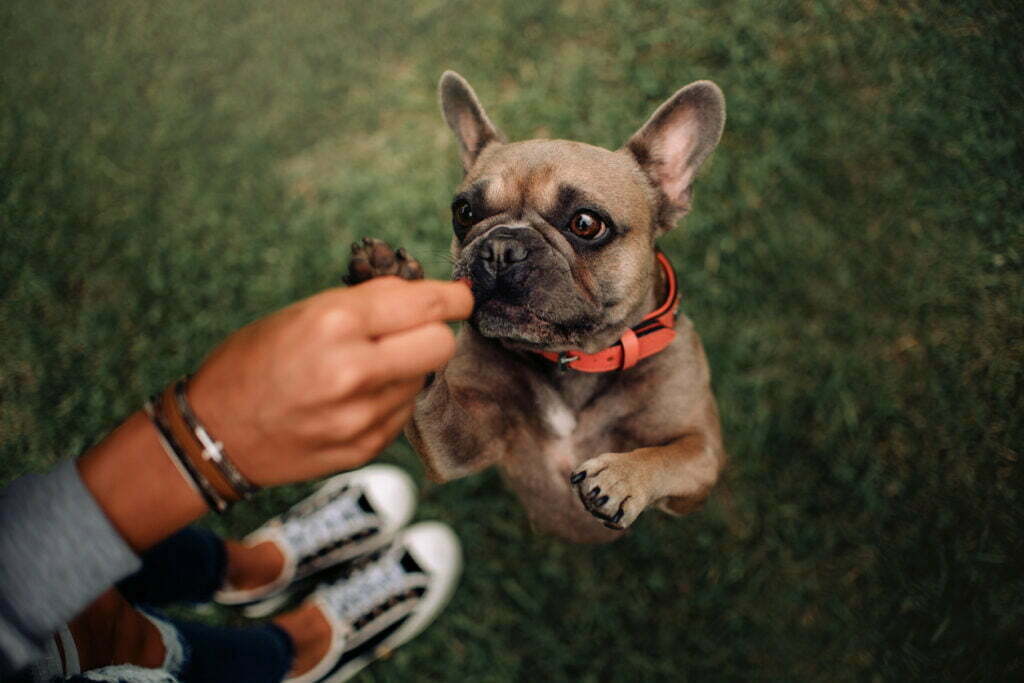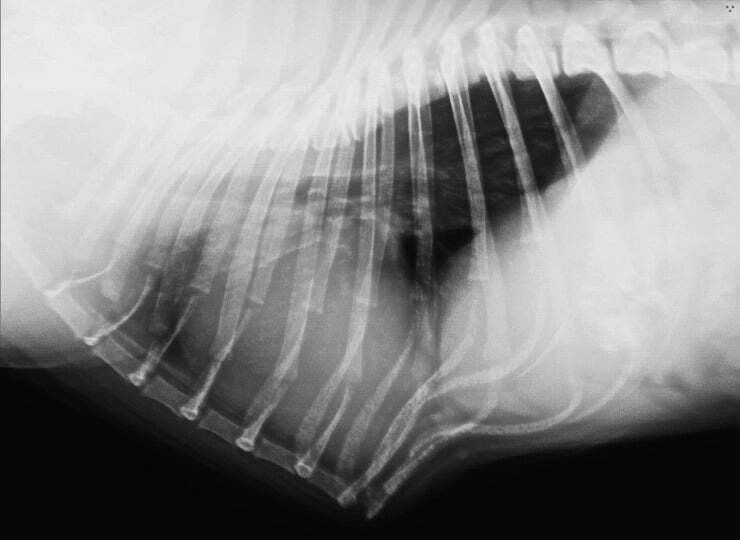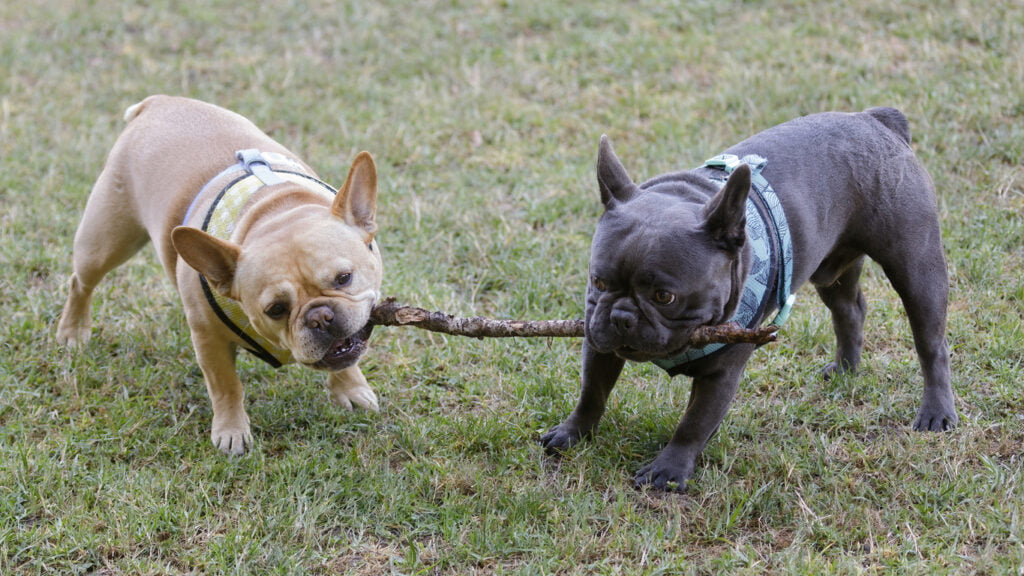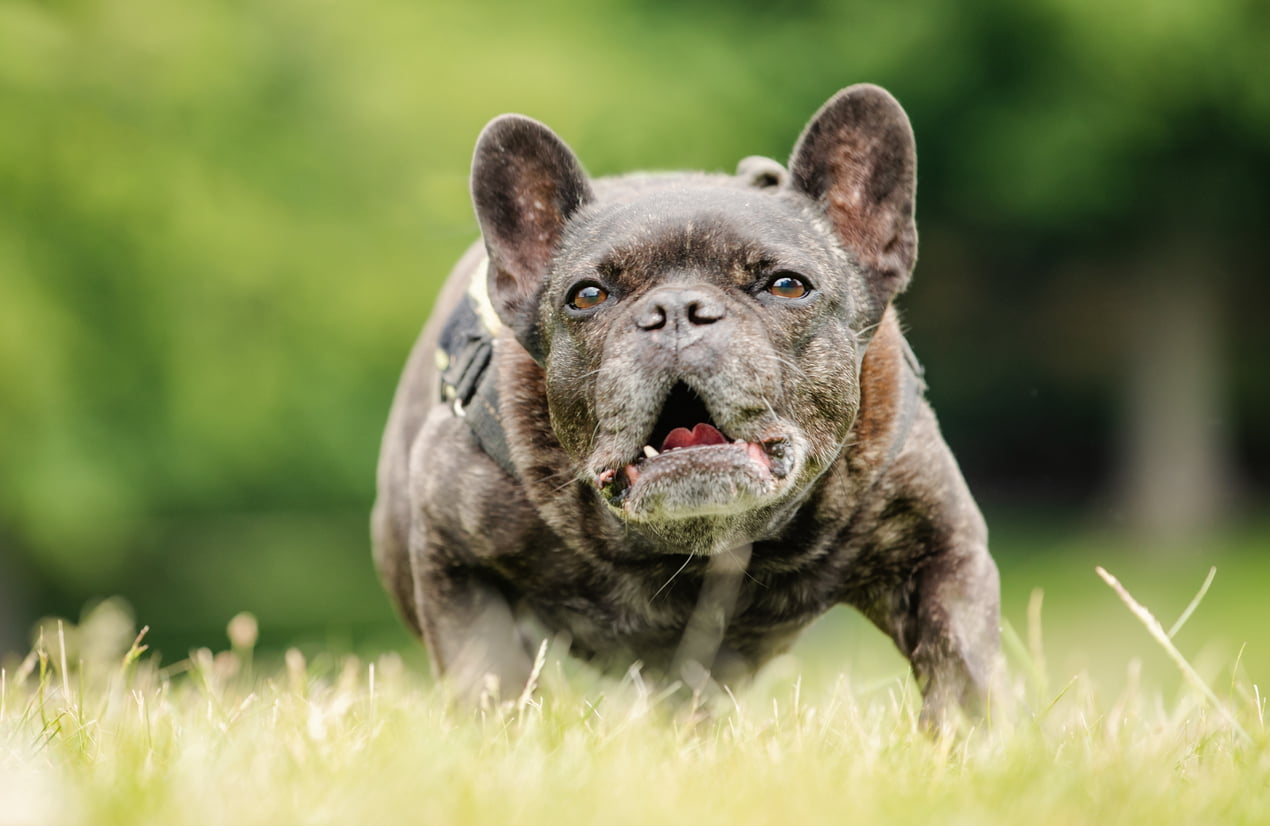Oh, French Bulldogs! With their adorable wrinkled faces and playful demeanor, they’ve stolen countless hearts. But have you ever wondered, are French Bulldogs aggressive? Fear not, dear reader, for we have embarked on an in-depth exploration of the French Bulldog temperament, from factors that might contribute to aggression to ways of preventing and managing such behavior, all while debunking some common misconceptions. Let’s dive into the world of these enchanting little companions!
Key Takeaways
- French Bulldogs are loving and devoted companions with playful personalities and unique temperaments.
- Understanding the genetic, environmental, and individual factors of French Bulldog aggression can help us manage it in a positive way.
- With early socialization, consistent training & positive reinforcement, we can create a safe environment for our Frenchie filled with love!
Understanding French Bulldog Aggression
French Bulldogs are generally known for their friendly and easygoing nature, but just like any other dog, they might exhibit aggressive tendencies under certain circumstances. To better understand why our beloved Frenchies might display aggression and be considered aggressive dogs, we need to delve into three main factors: genetic factors, environmental factors, and individual temperament.
By examining these aspects, we can gain a more comprehensive insight into the French Bulldog’s behavior and learn how to handle aggressive tendencies in a loving and effective way.
Genetic Factors
When selecting a French Bulldog, it’s important to be aware of the potential impact of poor breeding practices on the dog’s behavior. Reputable breeders prioritize the dog’s health and well-being, whereas puppy mills and pet stores might focus more on profit, possibly leading to health problems and aggressive tendencies in the pups.
Neutering male dogs can also play a role in reducing aggression, as it affects hormone levels and can help to alleviate certain forms of aggressive behavior.
Environmental Factors
A French Bulldog’s environment can greatly influence their behavior. Factors such as poor socialization, traumatic experiences, and separation anxiety can lead to aggressive behaviors. Ensuring your Frenchie receives proper training and providing a safe, secure home environment can help mitigate these issues and create a harmonious living situation for both you and your furry friend.
It is important to remember that a French Bulldog’s environment can have a major impact.
Individual Temperament
Each French Bulldog is unique and comes with their own set of personality quirks. Individual temperament can play a role in how likely a Frenchie is to display aggressive behavior, with factors such as fear, jealousy, and establishing dominance potentially contributing to such actions.
It’s important to remember that our sweet Frenchies are individuals, and understanding their specific temperament can help us effectively address any aggressive tendencies they might have.
Signs of Aggression in French Bulldogs

Being able to recognize the signs of aggression in French Bulldogs is crucial for ensuring the safety of both your Frenchie and those around them. Some common signs of aggression include growling, snapping, and tense body language.
By delving deeper into each of these signs, we can better understand our French Bulldog’s behavior and take appropriate action to manage aggression.
Growling
Growing in French Bulldogs can be an indication of fear, anger, or pain. It’s important to address growling with proper training, as ignoring this behavior or punishing your Frenchie could exacerbate the issue and increase their anxiety.
Instead, use positive reinforcement to reward your pup when they display desirable behavior and seek professional help if the growling persists or worsens.
Snapping
Snapping, like growling, can be a sign that your French Bulldog is scared, hurt, or agitated. If left unchecked, snapping can progress to biting, potentially causing harm to people or other pets.
Addressing snapping behavior early on is essential, and using positive reinforcement to reward good behavior can help discourage snapping and promote a more harmonious relationship with your Frenchie.
Body Language

Understanding your French Bulldog’s body language is key to identifying signs of aggression and preventing potential issues. Pay attention to their tail, head position, face, and limbs, as these can indicate hostility, anxiety, or happiness.
By observing your Frenchie’s body language and responding accordingly, you can help ensure their well-being and maintain a strong bond with your lovable companion.
Preventing and Managing Aggression in French Bulldogs

To keep our French Bulldogs happy and well-behaved, we can take steps to prevent and manage aggression. Early socialization, consistent training, and positive reinforcement can work wonders in helping curb aggressive tendencies and promote a more harmonious relationship between you and your Frenchie.
Let’s take a closer look at each of these preventive measures and how they can contribute to a happier, more peaceful life with our beloved Frenchies.
Early Socialization
Socializing your French Bulldog from a young age is crucial to preventing aggression and ensuring they are comfortable around other animals and people. Expose your Frenchie to a variety of people, animals, and environments to help them become well-rounded and secure, reducing the likelihood of developing behavioral issues such as fear and aggression.
Remember, a well-socialized French Bulldog with a good French bulldog temperament is a happy, confident, and healthy dog companion!
Consistent Training
Consistency is key when it comes to training your French Bulldog. These adorable pups can be quite stubborn, and they learn best through positive reinforcement and repetition. Establishing boundaries and expectations through consistent training can help manage aggression and ensure your Frenchie understands what is expected of them.
Remember, patience and persistence are essential when training a stubborn Frenchie!
Positive Reinforcement
Using positive reinforcement techniques can help manage aggression in French Bulldogs by:
- Rewarding good behavior with treats, praise, or playtime
- Discouraging negative actions
- Helping them associate good behavior with positive outcomes
- Encouraging them to continue behaving well
In time, your Frenchie will learn to associate aggressive behavior with a lack of rewards, helping to curb any aggressive tendencies.
French Bulldog Personality Traits

Now that we’ve explored the factors that can contribute to aggression in French Bulldogs, let’s take a closer look at their delightful personality traits. These charming canines are known for their affectionate nature, playfulness, and stubbornness.
Understanding these traits can help us better appreciate the unique characteristics of our beloved Frenchies and ensure that we are providing them with the love and care they need to thrive.
Affectionate Nature
French Bulldogs, members of the French Bulldog breed, are renowned for their affectionate nature and love for human companionship. Their loyalty and devotion to their owners make them wonderful family pets and loving companions.
This affectionate side can often counterbalance any aggressive tendencies, making them a well-rounded and delightful addition to any household.
Playfulness
Playfulness is a common trait in French Bulldogs, and they are known for their energetic and entertaining antics. However, it’s important to differentiate between play and aggression, as the two can sometimes be confused.
By recognizing the signs of playfulness and ensuring your Frenchie has an outlet for their energy, you can prevent misunderstandings and promote a happy, healthy relationship between you and your playful pup.
Stubbornness
Stubbornness can be a challenge when training French Bulldogs, as their strong-willed personalities might make them resistant to commands. However, with consistency and patience, you can overcome this trait and ensure your Frenchie is well-behaved and responsive to your commands.
Remember, even the most stubborn Frenchie can learn with a little love, persistence, and a few tasty treats!
French Bulldogs and Children

French Bulldogs are known for their love of children, making them wonderful family pets. However, it’s important to ensure the safety of both your Frenchie and your children by taking necessary precautions and supervising their interactions.
Let’s explore some ways to keep playtime safe and enjoyable for both our Frenchies and our little ones.
Safety Precautions
Taking safety precautions, such as teaching children how to interact with dogs, can help prevent accidents involving French Bulldogs. By educating your children on proper dog handling and behavior, you can ensure their safety and help them develop a loving and respectful relationship with your Frenchie.
Remember, a little education goes a long way in fostering a harmonious home environment for everyone.
Supervision
Supervising interactions between French Bulldogs and children is crucial to ensure the safety of both parties. By keeping a watchful eye on playtime and stepping in when necessary, you can prevent accidents and ensure that both your Frenchie and your child have a positive experience.
A little supervision can make all the difference in preventing bad behavior, keeping everyone happy and safe.
French Bulldogs and Other Pets

French Bulldogs are generally known for their compatibility with other pets, but as with any dog breed, it’s important to monitor their interactions and provide proper socialization.
In this section, we will examine the compatibility of French Bulldogs with cats and other dog breeds, offering insight into how to create a harmonious multi-pet household.
Compatibility with Cats

French Bulldogs can generally coexist peacefully with cats, but early socialization is key to ensuring a harmonious relationship. By introducing your Frenchie to your cat from a young age and giving them time to get used to each other, you can help prevent any potential conflicts and ensure that they become the best of friends.
Socialization should start as soon as possible, and it’s important to be patient and consistent.
Compatibility with Other Dog Breeds
When it comes to compatibility with other dog breeds, French Bulldogs may vary in their interactions. Some Frenchies may get along splendidly with other dogs, while others may require more socialization and supervision.
By monitoring your Frenchie’s interactions with other dogs and providing proper socialization, you can ensure that they develop positive relationships with their fellow canine companions.
Health Issues That May Affect Aggression in French Bulldogs

In some cases, health issues may be at the root of your French Bulldog’s aggression. Pain-related aggression and anxiety can both contribute to aggressive behavior in Frenchies. In this section, we will explore these health issues in more detail and discuss how addressing these underlying conditions can help to manage aggression in your beloved Frenchie.
It is important to note that aggression can be caused by a variety of factors.
Pain-Related Aggression
Pain-related aggression can occur in French Bulldogs suffering from health issues such as inflammation, bone fractures, or internal injuries. If your Frenchie is displaying signs of aggression, it’s important to consult with a veterinarian to address any underlying medical conditions that may be causing them pain.
By treating these health issues, you can help manage aggression and ensure your Frenchie’s well-being.
Anxiety and Stress
Anxiety and stress can contribute to aggression in French Bulldogs, as they may feel threatened or overwhelmed in certain situations. Managing these issues through training and environmental adjustments can help alleviate anxiety and reduce the likelihood of aggressive behavior.
Remember, a calm and stress-free environment is essential for the happiness and well-being of your Frenchie.
Myths and Misconceptions About French Bulldog Aggression

As with any dog breed, there are myths and misconceptions surrounding French Bulldog aggression. In this section, we will debunk some of these misconceptions and shed light on the true nature of our beloved Frenchies, including breed stereotypes and the difference between aggression and playfulness.
By understanding the facts, we can better appreciate and care for our charming companions.
Breed Stereotypes
Breed stereotypes can contribute to misconceptions about French Bulldog aggression, as people might assume they are naturally aggressive or difficult to train due to their breed. It’s important to remember that each dog is an individual, and their behavior may not necessarily align with breed stereotypes.
By treating each Frenchie as a unique individual and providing proper training and socialization, we can help them become well-behaved and loving companions.
Aggression vs. Playfulness
Distinguishing between aggression and playfulness in French Bulldogs can help prevent misunderstandings and ensure proper training and socialization for an aggressive dog. Dog aggression is characterized by growling, snarling, and stiff body language, while playfulness is marked by relaxed movements and playful vocalizations.
By recognizing the difference between the two and addressing any aggressive behavior accordingly, we can maintain a happy and harmonious relationship with our playful Frenchies.
Summary
In conclusion, French Bulldog aggression can stem from a variety of factors, including genetics, environment, and individual temperament. By understanding these factors and recognizing the signs of aggression, we can take steps to prevent and manage aggressive behavior in our beloved Frenchies. Through early socialization, consistent training, and positive reinforcement, we can help our charming companions become well-behaved and loving members of the family.
Remember, every French Bulldog is unique, and it’s essential to treat them as individuals when addressing any aggressive tendencies. By debunking misconceptions and understanding the true nature of our Frenchies, we can appreciate their delightful personalities and ensure a loving, harmonious relationship with our furry friends.
Frequently Asked Questions
Are Frenchies naturally aggressive?
French Bulldogs are not naturally aggressive and typically form strong attachments to their owners. If properly socialized and nurtured from an early age, this loving and playful breed will rarely exhibit aggression.
What is rage syndrome in French Bulldogs?
Rage Syndrome is a seizure disorder in French Bulldogs that causes outbursts of intense and unpredictable aggression. These reactions often include freezing, staring, and escalating to biting, usually in response to benign or innocuous stimuli.
What are some signs of aggression in French Bulldogs?
Growling, snapping, and tense body language can all be signs of aggression in French Bulldogs, so it is important to watch your pet’s behavior carefully.
Pay attention to any changes in your pet’s behavior, and be sure to intervene if you notice any signs of aggression. Taking the time to understand your pet’s body language and behavior can help you prevent any potential issues.
Are French Bulldogs compatible with cats and other dog breeds?
French Bulldogs can be great companions for cats and other dogs, but it’s important to socialize them properly and keep an eye on how they interact.
It’s important to introduce them to other animals slowly and carefully and to monitor their interactions to ensure that they are getting along.
It’s also important to provide plenty of positive reinforcement when they are doing well and to provide plenty of positive reinforcement when they are acting well.
